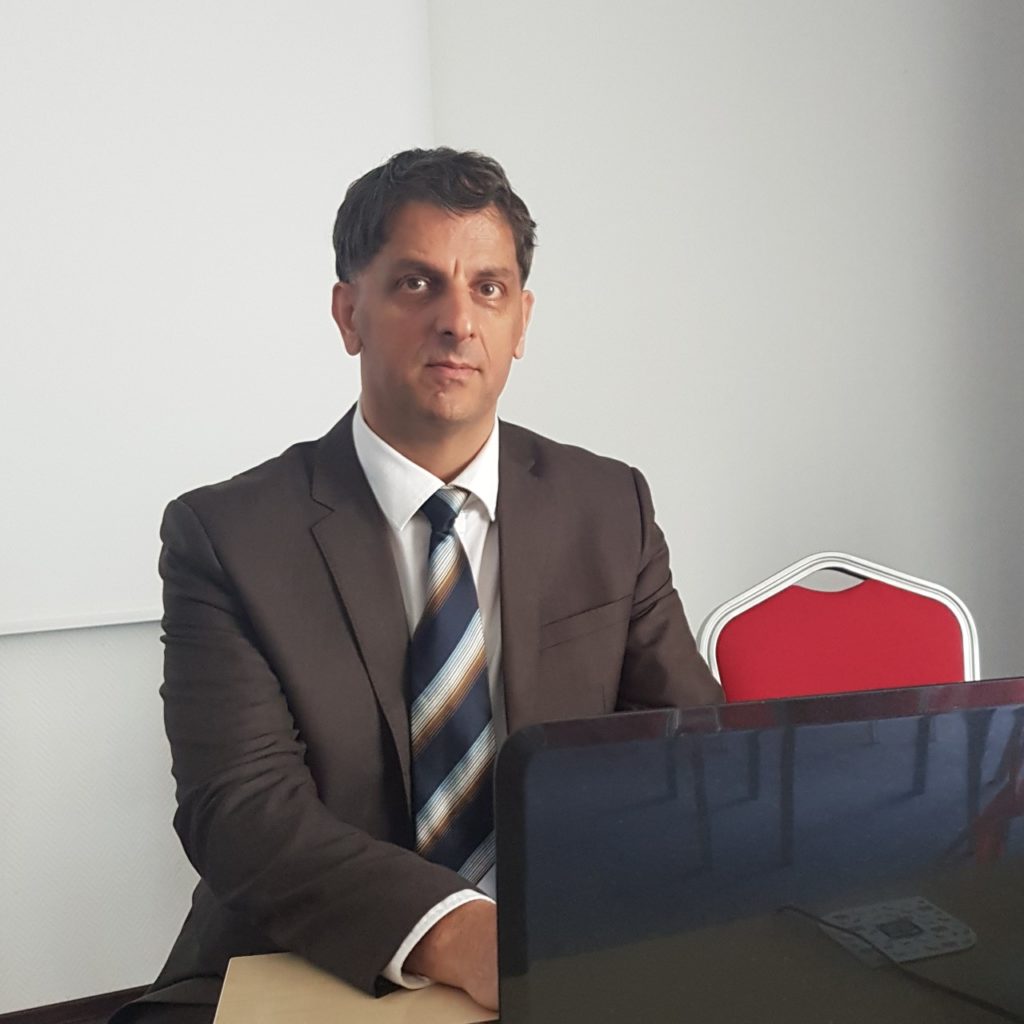The different terrorism risks for international trade – Interview of Music Safet, Associate at Tactics Institute for Security and Counter Terrorism of London and Senior Advisor in the BiH Ministry of Defense

Interview publiée le 28 Avril 2020
Centre Algérien de Diplomatie Economique : Dear Mr Safet Music, can you introduce yourself to our readers?
Safet Music : Safet Mušić, born in Mostar, is fortunate to have had two types of educations, military and civilian. Military education was by NATO standards and in NATO schools and centers. I received my civic education by graduating from the Faculty of Political Science in Sarajevo – Department of Defense and Security, then a master’s degree in international law. My doctoral thesis was about accepting extreme beliefs. I am proud to be the first in my generation to have completed a Master’s degree in Inter-religious Studies and Peacebuilding from the University of Sarajevo, jointly organized by the Faculty of Islamic Sciences, the Catholic Faculty, and the Orthodox Faculty. For more than a decade, I have been engaged in scientific research in the field of social development with an emphasis on social phenomena related to armed conflict, violence, and modern security challenges. I have published more than 30 research papers at prestigious international and domestic conferences as well as at scientific conferences. Also, I have been the principal investigator for three scientific research projects, as well as I have published 10 publications, one book, and currently preparing two books for publishing. Additionally, I have published many expert articles and analysis of different media. It is important to note that I have more than 20 years of practical experience in dealing with security issues as part of my functional duties in the defense structures of Bosnia and Herzegovina. I am employed as an expert advisor in the BiH Ministry of Defense, and I am a Fellow of the Tactics Institute in London.
CADE : Terrorist groups are evrywhere around the world, can you presente us a map of the most important groups?
Safet Music : When we talk about terrorist groups, we should keep in mind that this qualification is not experienced everywhere in the world. For example, you have different views on this issue from some important countries such as the US, Russia, Turkey, Iran, or China. In my opinion, it is important that we follow the guidelines and attitudes of the UN and that we also take into consideration the analysis of the activities of terrorist organizations in the world.
Although currently the main worldwide threat is the COVID-19 pandemic, that does not mean the terrorist threat is diminished. At the beginning of the year, slightly more terrorist activity was reported in West Africa, Mali, Niger, and Burkina Faso. From January 2020 to date, there have been 30 terrorist attacks worldwide, with over 670 dead. The most active terrorist groups were: Islamic State with its affiliated groups in Asia and Africa, Al-Qaeda with its associated groups such as Al-Qaeda in the Islamic Maghreb, Boko Haram, Al-Shabaab, Abu Sayaf and the PKK.
There are some other active terrorist groups that bind to political options, but some countries do not consider them as terrorist groups. There have been more terrorist attacks on civilians, such as in Yemen by Houthis. There have also been multiple terrorist attacks in Europe (2 in France, 1 in England), but with the highest death toll was in Germany, when a right-wing terrorist killed 10 people, including one Bosnian citizen. Also, there was a failed bomb attack in Scotland that police believe that responsible for it was Continuity IRA (CIRA).
Safet Music : International trade takes place through different channels: land, sea, air and electronic, what are the terrorist risks in each of those spheres?
Safet Music : Most terrorist attacks occur on land, then by air, somewhat less at sea, while it is still terminologically unclear whether we can talk about cyber terrorism. Specifically, there is no terrorist group yet that has the knowledge to commit terrorist attacks online, but it is not excluded that this will happen in the future.
Of course, the risk of terrorist attacks on the land is still the greatest, because they are the simplest and cause the greatest fear, which is the goal of terrorists. Currently, individual attacks, the so-called « lone wolves » currently targeting civilian targets, sometimes police officers, are likely to be most prevalent in the future, especially in the aftermath of the COVID-19 pandemic, when mass travel and mass public gatherings are expected.
When it comes to the risks of terrorist attacks by air, it is much reduced after airports have increased security levels. What I think is a particular risk in the future is the use of drones by terrorist groups or individuals. We have already had examples of the use of drones to attack oil fields in Saudi Arabia, as well as ships in the Arabian Gulf.
Regarding maritime terrorism, recent years have shown that it is quite up-to-date, precisely in the Arabian Gulf, but also on the seas in Southeast Asia and Africa. So it is to be expected that the number of terrorist attacks at sea, primarily oil tankers and other merchant ships, will increase.
The risk of online terrorist attacks, primarily on the Internet, is in my opinion, the most massive attempt by terrorists to reach the possibility of attacking high-profitable targets online.
CADE : Multinationals sometimes hire private security companies to protect their activities and the transport of their goods from ransoms and maritime piracy, do you have some examples ?
Safet Music : In the case of Lafarge, as far as I know, the French Court of Appeal dismissed the charges, otherwise the details of private security companies’ business were always concealed and it was difficult to prove anything.
I did some research on private security companies last year and came to the conclusion that in most cases these were actually private armies, with military armaments, structure and ex-servicemen.
I am aware of many examples of private security companies engaged in securing goods, facilities or infrastructure owned by multinational companies. We have such long-standing examples in the DRC, where, as in some other unstable states in Africa and Asia, private armies guard the interests of multinationals. It is known that the largest number of private security companies come from the US, but there are many in France and the UK, and in recent years such companies have been established in Russia, China, Ukraine. I think these are interesting examples of Russian private military companies, the most famous being Wagner, which was engaged in Ukraine, then Syria, and some African countries such as Libya, Central African Republic and Madagascar, and South America in Venezuela. The lesser-known Russian private military company Shield (Scit) has been hired to guard several gas installations owned by Stroytransgaz, which belongs to Russian billionaire Genadi Timchenko. The headquarters of Private Shield is located in the city of Kubinka, which is located near the 45th Special Forces Air Force Brigade, whose former members work as instructors for Shield.
CADE : Countries are the major players in the fight against terrorist groups, how do those various governments operate to fight the threats that hamper international trade?
Safet Music : Of course, the United States is the largest counterterrorism leader among countries in the world, and they support the prevention and counter-terrorism across the world. What sets the US apart from other world powers is that they are also selfless in imparting knowledge and experience in the fight against terrorism. The United States is helping to make the most of the terrorism threat in the world, which in my opinion is a very important segment of the fight against terrorism. Other countries are mainly primarily interested in protecting their national but also economic and interests, and then participate in the exchange of information or to a limited extent assist the world in the fight against terrorism.
Terrorism is affecting trade in many ways, which is reflected in greater security additions to ports and airports and higher insurance premiums. By reducing trade, it makes countries poorer, and this makes it more difficult to fight terrorism. Particularly terrorism has affected the sub-Saharan Africa region, which is also reflected in a weakening of trade and makes these and surrounding countries even poorer.
In any case, preventative security measures are needed to secure trade, infrastructure and livelihoods.
CADE : Finally, how we can reduce or eradicate the impact of the terrorist risk for the internatinal trade ?
Safet Music : The estimated direct economic cost of the 9/11 terrorist attacks. Including indirect effects such as stock market volatility and lost tourism dollars, the total impact is estimated to be around $2 trillion.[1]
This information in itself speaks volumes about the damage to the economy, and therefore trade, due to terrorism. Globalization is also affecting transnational terrorism, which has serious consequences on international market systems. There is evidence that during the period of the terrorist attacks in France (2015-2016), France’s foreign trade decreased by about 2%.
Policy makers need to help companies anticipate and learn how to respond to terrorist events, but also to incorporate into their margins the risk of terrorist attacks, according to the characteristics of their economies.
Of
course, the same principles of international co-operation remain in the fight
against terrorism, which is the unselfish and timely exchange of information by
key actors, followed by planned action in counter-terrorism operations,
especially those protecting all trade routes, whether sea, land or air.
Particular emphasis on counter-terrorism measures at the international level in
the coming years should be given to the protection against cyber attacks, which
is likely to increase. At present, this is well done by EUROPOL for the EU
area, but stronger ties are needed throughout the democratic world.
[1] Govinfo.gov. « WAR AT ANY COST? THE TOTAL ECONOMIC COSTS OF THE WAR BEYOND THE FEDERAL BUDGET. » Accessed March 19, 2020.
Entretien réalisé par l’équipe du Centre Algérien de Diplomatie Economique



